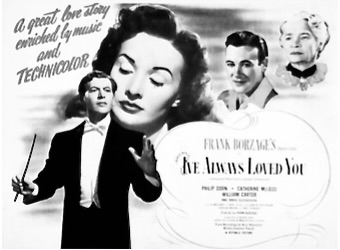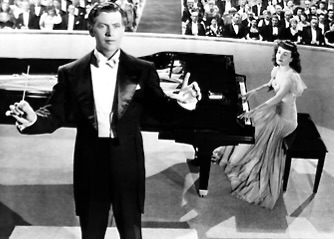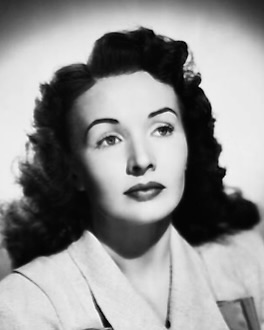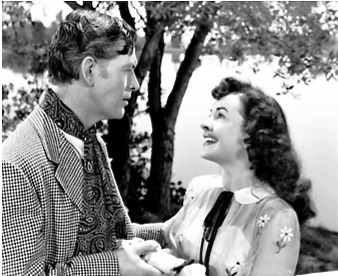
“Music goes on forever.”
At one point Madame Goronoff (Maria Ouspenskaya) tells her concert maestro grandson (Philip Dorn) that men and women come and go, that young beauty grows old, but music goes on forever. Indeed, music is the greatest love in the maestro’s life. Until one day when he meets the pretty daughter (Catherine McLeod) of a former associate (Felix Bressart). Then, his life goes in a decidedly new direction.
It’s also a new direction for the young woman, since she will become tutored by Dorn and turned into a great concert pianist. It won’t be easy for either of them, especially McLeod, or the ones who love them most.

In Dorn’s case, his grandmother and his followers fret about his every move. In McLeod’s case, there is a handsome farm hand back home (Bill Carter) who is concerned about her just as much as her father. After Bressart’s character dies, Carter and his mother (Elizabeth Patterson) take over the farm, since McLeod is off on a world tour with Dorn and Ouspenskaya.

The globe trotting episodes, showing the young pygmalion and her Svengali mentor in Europe and South America, are interesting to watch. The set design is truly fantastic; so are the clothes and furnishings— all presented in luscious Technicolor. It’s obvious Republic spent a lot of money on this particular prestige production, directed by A-list director Frank Borzage. This is a far cry from the B westerns the studio churned out with Gene Autry and Roy Rogers.
McLeod is perfectly cast as a hardworking musician and practical farm girl who becomes a bit too worldly for her own good, then has to make a decision about the rest of her life.

Dorn’s character is nearly impossible at every turn— he’s supposed to be demanding, but his annoying sexist behaviors don’t do him any favors— and it’s easy to see why McLeod ultimately leaves him after a successful performance at Carnegie Hall. She goes back to the farm, marries Carter and has a daughter (Vanessa Brown). But we know she still hasn’t really gotten Dorn out of her system.
In some ways Carter’s wholesome rural character becomes a bit of a villain. After their marriage, he forbids his wife from playing the piano in their home. Then, when their daughter is old enough to start playing, he expects his wife to take the girl off to New York to get the professional opinion of her old maestro (Dorn). But he also wants to see if his wife still has unresolved feelings for his upper class rival.

One thing I particularly like about this film is that we aren’t ever sure which man McLeod’s heart truly belongs to…and we have to wait until the final scene to find out which one she’s always loved more. Mixed into all this melodrama are some excellent musical scenes (with Arthur Rubenstein playing on the soundtrack). Borzage doesn’t ever rush us through the numbers, so musical performance is just as key to the film’s overall identity as the characterizations and romantic plot.
As I finished watching this motion picture, I realized that people in the mid-1940s had a clearer understanding of who they were, or who they should be, even when momentary confusion or conflicts set in. There is something to be said about the relationships we forge in life, and the people we learn great lessons from, in how they conform with our individual values.

I like this film a lot, but Catherine Macleod is a favorite. I always look for her.
Perhaps you’ve seen her in another film Borzage directed at Republic…THAT’S MY MAN with Don Ameche. She has a very peaceful screen presence.
Of course, on its initial release and later on Blu ray.
Thanks Barry for the comments. Not sure if this site will let me post the link, but a group of us discuss classics more in-depth on a message board. You are welcome to join us at classicfilmtvradio dot freeforums dot net